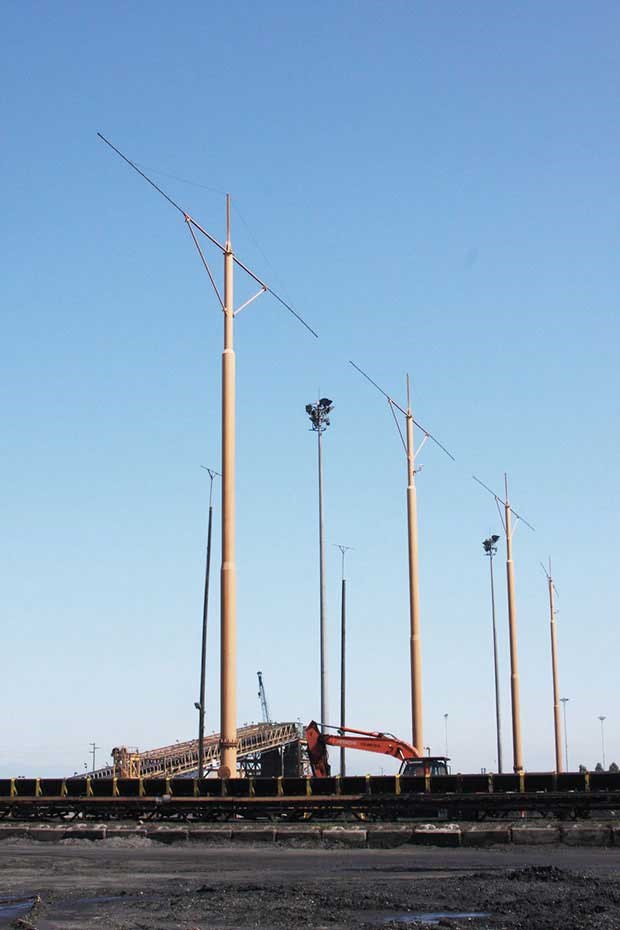Westshore Terminals has completed millions of dollars worth of upgrades in recent months in its ongoing efforts to suppress coal dust.
The coal port, which has been operating at Roberts Bank since 1970, has invested $8.5 million on a dust suppression system that includes low-level sprayers, spray towers, a water recycling system, two mobile air monitoring units and a coal train surveillance station.
David Crook, Westshore's manager of environmental services, outlined the changes for civic politicians Monday night.
The facility has completely replaced the equipment used to keep coal dust to a minimum, adding 94 low-level sprays, which replaced the old 77 ground-level rain guns, while 17 new water spray towers now ring the site.
"We completely replaced our rain gun system," Crook said. "Each of these rain guns was replaced in kind with a newer, better model that actually throws the water further... It's vastly improved our ability to spray water."
The low-level sprays are used in low wind conditions, he said, but when the wind picks up, the company switches to the spray towers. The towers are 130-feet tall with a 130-foot-wide cross arm.
Westshore also spent $5.5 million on a water recycling system. The low-level sprays use recycled water that has been collected and cleaned of any dust and dirt.
In addition to the new onsite dust suppression system, Westshore has installed a train surveillance station at the 80th Street overpass.
The high-tech system allows the company to monitor coal trains on their way to the port online.
"And so far, I must say, the vast majority of the trains have been very well behaved, although we have seen a couple of dusting trains that we've referred back to the mines and the railways for further action," Crook said.
Vice president and general manager Denis Horgan said Westshore is quick to report trains it feels are not adequately treated to combat coal dust.
"Any time we see a train that is not acceptable we would report immediately back to the mine and the railroad," he said.
Horgan said a few months before the camera was installed, Westshore was alerted by municipal hall to a couple of badly dusting trains enroute to Delta. He said the company was able to determine which mine the trains were coming from and was able to stop a third one in Kamloops.
"It turned out their spray system wasn't working properly at the mine site so they fixed that. If we know there's a problem train in transit, we would stop it."
Westshore also now has two mobile air monitoring units available to assess if there is any coal dust in a given area. The self-contained units can be placed anywhere in the community to get a handle on the quality of the air.
"Anecdotally, we hear lots of complaints about the fact that there is (coal) dust in the community," Crook said.
He added the company has investigated the complaints on many occasions and in most cases there has been no coal dust involved.
"Of 17 investigations that we've performed in the last 10 years, 13 had no coal dust whatsoever. So it's an indication of the fact that we can see black material and think it's coal dust and it actually isn't," he said.
"We don't like being blamed for the stuff that isn't ours. We'll take responsibility for what is."
Delta has also undertaken a dust fall monitoring project of its own. Earlier this summer, staff established five temporary monitoring sites - four in Tsawwassen and one north of the Boundary Bay Airport adjacent to the rail tracks. Canisters were set out to collect dust samples over 30 days. The collection period ended on Monday and the samples will be sent to a lab for testing to determine if coal particles are present.
The results are expected later this month.
Horgan said Westshore is also planning to spend $200 million over the next five years investing in its infrastructure starting early next year. The company's 30-to 40-year-old major coal handling equipment will be replaced and its offices and workshops relocated.



